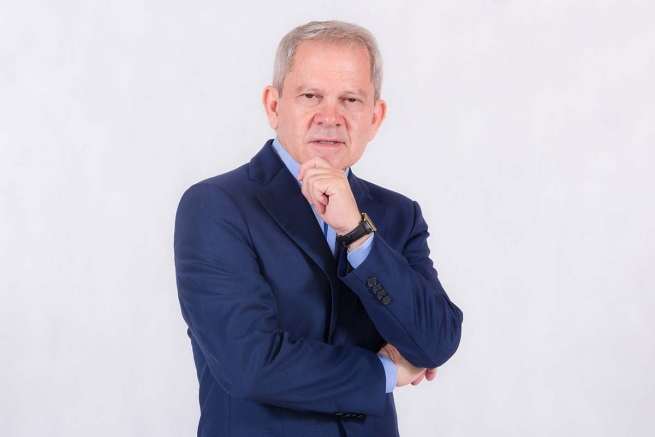What should the best educational practices be?
Educate to responsibility and critical spirit with regard to the digital setting. Living digitally affects the way we express ideas, create our communication policy, share information, express ourselves, and see the world and the realities in which we live. This requires great responsibility, so that we can always communicate without dominating, relate without controlling people, express ourselves without the temptation of worldly power.
We will thus be faced with challenges such as individualism and relativism. Problems that take on the traits of self-referentiality, indifference, lack of respect for nature, up to and including various forms of violence. Then sometimes, even unconsciously, digital communication propels people and leads to situations of personal and group conflict, even to forms of radicalism. This can lead to a crisis of digital identity. A kind of contemporary version of Plato’s “cave myth”. Instead of seeing the shadows on the wall of a life happening elsewhere, the prisoner is forced not only to observe himself, but also to see others showing themselves on social media. This can transform us profoundly.
What is the importance, for the Salesian Family, of understanding the digital methodology in favor of the evangelisation of young people, especially those in socially vulnerable situations?
6. The Salesian Congregation, in its different areas of intervention, aims to always keep up with the times. An attitude that has led us, over the years, to the continuous search for dialogue between faith and science, the Gospel and youth culture, the Preventive System and the digital world. As educators of young people we have certainly found ways to respond to the great transition of communication towards information technologies, the Internet and social networks.
Together with lay people and educators, we seek to approach reality by listening to the new generations, accompanying teenagers in their social worlds, finding new languages and new methods to educate them to love, to the meaning of life and responsibility, to the construction of their personal project, starting from the values of the Gospel and the Preventive System.
Through countless Salesian works, especially in Africa and Latin America and the Caribbean, we educate young people of different classes, especially those most in need, to prepare themselves on a technical and human level to the use of new technologies applied to education, the arts, work, social promotion and leisure.
What qualities should we absolutely “pass on” to the touch generation?
14. Information technology has transformed the way we think and act. It has influenced all human activities: the way we study, work, travel, shop, do research, listen to music... The digital reality is to be found in almost everything we do. We have recently observed the impact that artificial intelligence has had, for example in medicine, scientific research, creativity and economics.
The great technological achievements on the one hand contribute to human, social and cultural development; on the other hand they question the person. Our security and privacy are at risk and a reflection on the ethics of artificial intelligence and the emergence of the digital divide is increasingly urgent. Moreover, the digital world has catapulted the human being into a new temporal and spatial dimension, characterised by instantaneousness and interactivity. This dynamic has led to the emergence of various challenges, such as the importance of dialogue in different social and cultural contexts; the care of psycho-social health; ethics in the processing and transmission of news, with respect for the person and his or her values.
What sort of “digital curfew” should be invented?
I would say: personal and social responsibility! A deep and attentive critical spirit towards digital matters! Sic et simpliciter: balance! A digital citizenship that allows each person to be responsible for implementation at the level of community, organisation, Church groups, social and artistic groups, taking care of political management at the micro and macro levels in each country. The digital world is part of the common good. Citizens of every society must have space, structures and legislation that allow them to participate in public policies, such as cooperation with school activities, health, sports and art.
How can “reason, religion and loving kindness” be applied to the touch generation?
First of all, trust young people! They are the true protagonists in the digital world.
Despite this, we should not be afraid of digital matters because it remains a great opportunity to educate and evangelise, but it always requires reflection and discernment. Starting from the gospel, it is important to put communion at the centre of any form of communication, maintaining a Salesian educative and pastoral vision and an ethics that ensures respect for the human person and the entire community.
In order to have a healthy relationship with the digital environment we need to put young people at the centre. Indeed, the Salesian’s approach cannot be reduced to the trivial and superficial suggestion to download social apps on one's smartphone or to become a star on Instagram or Twitch. Always educate for creativity and responsibility.
Rather, it is necessary to take the approach of dynamic accompaniment, which translates into “walking alongside” young people who live most of their lives with their eyes focused on the screen of their mobile phones. More necessary, as Don Bosco would say, is that they know that they are loved!
We know that the digital world is destined to grow, to become more sophisticated and faster, especially with artificial intelligence. Technology goes hand in hand with the progress of humanity, it plays a fundamental role in the development of science, knowledge, great discoveries, its immense contribution to education, health, democracy, justice and peace.
But it is the responsibility of every citizen and Christian to ethically educate themselves to be true protagonists in the use of technology for the well-being and safety of their children, family, community and society in general.


